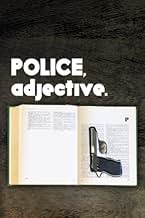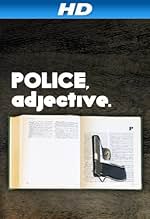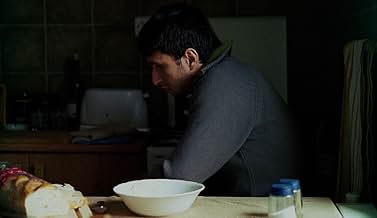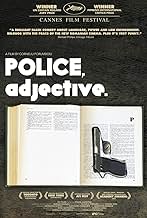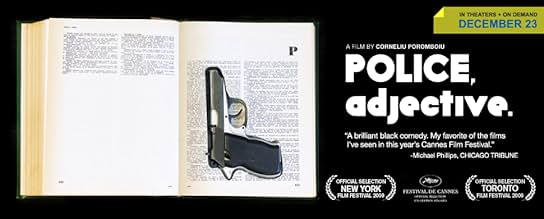IMDb-BEWERTUNG
6,9/10
5446
IHRE BEWERTUNG
Füge eine Handlung in deiner Sprache hinzuA police officer refuses to arrest a young man for offering drugs to his friends.A police officer refuses to arrest a young man for offering drugs to his friends.A police officer refuses to arrest a young man for offering drugs to his friends.
- Auszeichnungen
- 15 Gewinne & 15 Nominierungen insgesamt
George Remes
- Vali
- (as Remes George)
Constantin Dita
- Officer on Duty
- (as Costi Dita)
Empfohlene Bewertungen
This is a film about a policeman and a matter of conscience. There's a circle of three friends, two boys and a girl, one boy has denounced the other boy to the police for supplying marijuana, it appears that this is so he can have the girl to himself. Our policeman, Cristi is being pressed to slap the cuffs on the kid by his superior, the charge is a life-wrecker, seven years in prison for smoking joints at lunch break. Cristi spends the movie trying to avoid this outcome. As he says, it's a foolish law.
Cristi is pushing against a bureaucracy that simply doesn't care, and ends up looking like a fool when he talks to people who are more educated with him, for example suffering his girlfriend's overanalysis of a ludicrous ballad, or the pseudo-dialectics of his boss, a masterpiece of sophistry. The point is that language or words often constitute another form of aggression, as the Athenians knew, you can win any argument once you have mastered rhetoric. Of course, as soon as anyone raises their voice or gets upset, this is taken as a sign that they've lost the argument, the intellectual warfare, losing having nothing whatsoever to do with being right or wrong of course.
The film is about conscience, something that totalitarian societies tried to eliminate in favour of the wisdom of the law. Good film although some of the intricacies of the discussions were lost on me not being a Romanian, and unable to follow the thread of Romanian spelling and grammar.
I actually loved the movie on an aesthetic level, I doubt it was intentional, but I always pick up on dashes of yellow in visual arts, an eccentricity of mine. For example in the street where the kid under surveillance lives, all the utilities pipes that come out onto the street are painted bright yellow, the young girl appears first wearing a bright yellow top under denim, and Cristi uses a yellow lighter and a yellow pen, most of the rest of the colour in the movie is very dull and subdued, I enjoyed these flashes. It's also nice seeing old communist offices, nowadays in the west everything is open plan and new, no-one has offices except the capo di tutti capi. Here there's peeling plaster, old caved in lockers, and a little peace and quiet. Hell I even liked just seeing Cristi sat down eating. Then there's the formal way where letters and plans are just shown on the screen with no background. I like the style of the police reports.
I would just point out that based on my understanding of the film, the English title is a mistranslation, politist is like the French word policier, which all we can translate as is "police procedural"; another translation is "policeman". The translations are nouns though so I was a little confused as to why it's being referred to as an adjective. Maybe the error is meaningful?
Cristi is pushing against a bureaucracy that simply doesn't care, and ends up looking like a fool when he talks to people who are more educated with him, for example suffering his girlfriend's overanalysis of a ludicrous ballad, or the pseudo-dialectics of his boss, a masterpiece of sophistry. The point is that language or words often constitute another form of aggression, as the Athenians knew, you can win any argument once you have mastered rhetoric. Of course, as soon as anyone raises their voice or gets upset, this is taken as a sign that they've lost the argument, the intellectual warfare, losing having nothing whatsoever to do with being right or wrong of course.
The film is about conscience, something that totalitarian societies tried to eliminate in favour of the wisdom of the law. Good film although some of the intricacies of the discussions were lost on me not being a Romanian, and unable to follow the thread of Romanian spelling and grammar.
I actually loved the movie on an aesthetic level, I doubt it was intentional, but I always pick up on dashes of yellow in visual arts, an eccentricity of mine. For example in the street where the kid under surveillance lives, all the utilities pipes that come out onto the street are painted bright yellow, the young girl appears first wearing a bright yellow top under denim, and Cristi uses a yellow lighter and a yellow pen, most of the rest of the colour in the movie is very dull and subdued, I enjoyed these flashes. It's also nice seeing old communist offices, nowadays in the west everything is open plan and new, no-one has offices except the capo di tutti capi. Here there's peeling plaster, old caved in lockers, and a little peace and quiet. Hell I even liked just seeing Cristi sat down eating. Then there's the formal way where letters and plans are just shown on the screen with no background. I like the style of the police reports.
I would just point out that based on my understanding of the film, the English title is a mistranslation, politist is like the French word policier, which all we can translate as is "police procedural"; another translation is "policeman". The translations are nouns though so I was a little confused as to why it's being referred to as an adjective. Maybe the error is meaningful?
In "Police, Adjective", Romanian director Corneliu Porumboiu devotes himself to the story of a small town cop reluctant of busting a minor for endorsing hashish with friends. Although vague at first, we learn that the civil police Cristi is having an unease conscience about nailing the young man, which may inflict seven years in prison for what Cristi believes to be a petty crime that will – soon enough – be looked upon more liberated. Throughout pic we follow his daily routines and interactions in the downbeat and austere town of Vaslui, including scenes of parodic bureaucracy and laudable lengthy takes.
"Police, Adjective" is admittedly in many ways difficult to interpret. The first half of the film deals with classic police work (classic as in reality, not classic as in previously depicted on film) including Cristi's pursuit of suspects and filing reports. For an audience used to clustered action flicks, this may seem as tedious and unbearable to endure. From a more objective perspective, I find it somewhat original and daring. This course of the film is harmless, it is on the contrary a certain, yet inevitable cul-de-sac initiated by a mere typo, that pushes it in a slightly too academic stand. On the other hand, it could also be considered an ironic twist when deciding how Cristi's moral dilemmas should be solved.
One of the more unfortunate aspects of Porumboiu's directing, in particular substantial for "Police, Adjective" but nonetheless equally visible in previous film "12:08 East of Bucharest", is that the (black) humor sometimes may appear so subtle that when juxtaposed to foreigners it can be completely lost (in translation.)
Watching Porumboiu's battle between an objective and supreme law versus Cristi's subjective conscientious law is evidently quite fascinating, despite being a bit too submissive at times.
"Police, Adjective" is admittedly in many ways difficult to interpret. The first half of the film deals with classic police work (classic as in reality, not classic as in previously depicted on film) including Cristi's pursuit of suspects and filing reports. For an audience used to clustered action flicks, this may seem as tedious and unbearable to endure. From a more objective perspective, I find it somewhat original and daring. This course of the film is harmless, it is on the contrary a certain, yet inevitable cul-de-sac initiated by a mere typo, that pushes it in a slightly too academic stand. On the other hand, it could also be considered an ironic twist when deciding how Cristi's moral dilemmas should be solved.
One of the more unfortunate aspects of Porumboiu's directing, in particular substantial for "Police, Adjective" but nonetheless equally visible in previous film "12:08 East of Bucharest", is that the (black) humor sometimes may appear so subtle that when juxtaposed to foreigners it can be completely lost (in translation.)
Watching Porumboiu's battle between an objective and supreme law versus Cristi's subjective conscientious law is evidently quite fascinating, despite being a bit too submissive at times.
Police, Adjective This is an absolutely brilliant film. Many films have been made in Germany or the Czech Republic or Spain or various Latin American countries, and so on and on, about periods of interregnum between one form of government and another. Writer/Director Porumboiu goes right to the details in Romania. He takes the smallest possible case, an undercover officer checking out a high-school drug dealer, and makes us wonder about the biggest metaphysical situations involving law and justice. Wisely—almost incredibly—Porumboiu sets aside macropolitics and doesn't make a partisan or political film. Instead, he forces us to imagine the links between private behaviour and philosophical concepts.
Many people are constantly writing that the movie is too slow or too long. Hell, I say that about car-chase movies that are 90 mins. of explosions or 130 mins. of James Cameron's computer-animation teams. There is not one wasted second in this film. It is not indulgent in the slightest. There are no car chases. This is a movie about a narc tailing a high-school kid. That's what it is. The only time the movie really really drags is when Cristi, the narc/undercover guy, is watching the home of the alleged squealer. That does go on for a long time, but, structurally, it makes sense, and Porumboiu leavens it a bit by making Cristi get tea from a nearby shop and discuss what he's doing in a communist-realist way that chips in to the overall narrative.
The way Porumboiu binds the film together is admirable—we see Cristi early on telling his overweight colleague that that colleague just can't play soccer with them—those are the rules. Then Cristi gets told by the prosecutor that he isn't entitled to comment on laws. And then there's Cristi's girlfriend (the rules of language), and Zelu (sees all laws, accepts none, really) and Cristi's boss, Angelache (the rules of law, expressed by language).
The endless opening and closing of doors, the bureaucracy, the people who think their lives are so much more important than yours, is compelling. Cristi never really imposes. He just has a sense of what is right (and he is a policing figure). His overweight colleague puts upon him. His lazy (political but useless) colleague Zelu is of no help. He goes to the prosecutor (Marian Ghenea—in a truly wonderful performance) and is granted a promise that we later learn has probably been betrayed. Costi, Vali, Doina—all are unwilling to act, knowingly or unknowingly, towards justice. Part of what made The Death of Mr Lazarescu by Puiu so compelling was precisely the fact that one knew that, whether or not you had the greatest American health insurance in the world (or even the most money in the world, maybe), or you lived in a country with one of the greatest public health insurance programs there were, you still were not immune to basic human failings. If Puiu did that with health care and medicine, Porumboiu does that with law and justice and society. What Poromboiu shows us, relentlessly, is that our lives are contingent upon others, and if others treat us the way we treat them, well. . . .
There just isn't a bad performance in this film. One would finally have to say that Dragos Bucur is effective in his impossible role. He is the hunched anti-hero post-communist but still communist narc. His girlfriend, Anca, can talk of anaphoras, but when he tries to express what he knows is right, the state, in the person of well-known Vlad Ivanov, gets Cristi out a dictionary from which he cannot escape. Dictionaries, after all, like language, are arbitrary documents. A "tree" in Brazil means something entirely different from a "tree" in Siberia. Language is arbitrary and contextual, and this sophisticated film works with this knowledge.
This is a carefully filmed movie that rarely draws attention to itself. As far as I can tell, every time Cristi is shadowing someone, the effect is very authentic. There are a lot of long shots. Close shots are sparing. Office shots are always as they should be or oblique. When Cristi gets back to his flat, the way Porumboiu films it so that we could only ever see the hallway and never a bedroom or any kind of intimacy at all is very, very wisely done. In some respects, Porumboiu boldly refuses to answer American hopes. He gives us no cheesy intimacy, and keep us always focused on Cristi, the man outside—outside shadowing a kid who may be a drug dealer, outside the changing Romanian legal system, outside his girlfriend's perfect—but changeable—command of language. Maybe Anca is the one who really ought to be determining things, for images are symbols, and symbols are images.
As for the climactic scene, 20 mins. of pure dictionary: I can't think of 20 other minutes I'd love to watch more, from _The Getaway_ to _Unforgiven_. The climax of _Police, Adjective_ is utterly riveting, if you've grasped what has gone on before.
This is just an all-around great movie. At times, you can sense opportunities for indulgence, but Porumboiu never takes them. I hope he'll continue not to.
Yes, it's a given that people not from the U.S. may not understand movies from other places. But I'm getting a little bit tired of this. I can watch movies from Korea or Argentina or just about any country in the world and enjoy them and understand them and feel my way into them and engage with them intellectually and emotionally.
Police, Adjective is definitely going to go down as a very important film. It comprises the human and the metaphysical the while excising the obvious political. That makes it political. This is an important film. Negative reviewers desperately cling to seeing "police" as a noun, and that is not what this film is about. ww
Many people are constantly writing that the movie is too slow or too long. Hell, I say that about car-chase movies that are 90 mins. of explosions or 130 mins. of James Cameron's computer-animation teams. There is not one wasted second in this film. It is not indulgent in the slightest. There are no car chases. This is a movie about a narc tailing a high-school kid. That's what it is. The only time the movie really really drags is when Cristi, the narc/undercover guy, is watching the home of the alleged squealer. That does go on for a long time, but, structurally, it makes sense, and Porumboiu leavens it a bit by making Cristi get tea from a nearby shop and discuss what he's doing in a communist-realist way that chips in to the overall narrative.
The way Porumboiu binds the film together is admirable—we see Cristi early on telling his overweight colleague that that colleague just can't play soccer with them—those are the rules. Then Cristi gets told by the prosecutor that he isn't entitled to comment on laws. And then there's Cristi's girlfriend (the rules of language), and Zelu (sees all laws, accepts none, really) and Cristi's boss, Angelache (the rules of law, expressed by language).
The endless opening and closing of doors, the bureaucracy, the people who think their lives are so much more important than yours, is compelling. Cristi never really imposes. He just has a sense of what is right (and he is a policing figure). His overweight colleague puts upon him. His lazy (political but useless) colleague Zelu is of no help. He goes to the prosecutor (Marian Ghenea—in a truly wonderful performance) and is granted a promise that we later learn has probably been betrayed. Costi, Vali, Doina—all are unwilling to act, knowingly or unknowingly, towards justice. Part of what made The Death of Mr Lazarescu by Puiu so compelling was precisely the fact that one knew that, whether or not you had the greatest American health insurance in the world (or even the most money in the world, maybe), or you lived in a country with one of the greatest public health insurance programs there were, you still were not immune to basic human failings. If Puiu did that with health care and medicine, Porumboiu does that with law and justice and society. What Poromboiu shows us, relentlessly, is that our lives are contingent upon others, and if others treat us the way we treat them, well. . . .
There just isn't a bad performance in this film. One would finally have to say that Dragos Bucur is effective in his impossible role. He is the hunched anti-hero post-communist but still communist narc. His girlfriend, Anca, can talk of anaphoras, but when he tries to express what he knows is right, the state, in the person of well-known Vlad Ivanov, gets Cristi out a dictionary from which he cannot escape. Dictionaries, after all, like language, are arbitrary documents. A "tree" in Brazil means something entirely different from a "tree" in Siberia. Language is arbitrary and contextual, and this sophisticated film works with this knowledge.
This is a carefully filmed movie that rarely draws attention to itself. As far as I can tell, every time Cristi is shadowing someone, the effect is very authentic. There are a lot of long shots. Close shots are sparing. Office shots are always as they should be or oblique. When Cristi gets back to his flat, the way Porumboiu films it so that we could only ever see the hallway and never a bedroom or any kind of intimacy at all is very, very wisely done. In some respects, Porumboiu boldly refuses to answer American hopes. He gives us no cheesy intimacy, and keep us always focused on Cristi, the man outside—outside shadowing a kid who may be a drug dealer, outside the changing Romanian legal system, outside his girlfriend's perfect—but changeable—command of language. Maybe Anca is the one who really ought to be determining things, for images are symbols, and symbols are images.
As for the climactic scene, 20 mins. of pure dictionary: I can't think of 20 other minutes I'd love to watch more, from _The Getaway_ to _Unforgiven_. The climax of _Police, Adjective_ is utterly riveting, if you've grasped what has gone on before.
This is just an all-around great movie. At times, you can sense opportunities for indulgence, but Porumboiu never takes them. I hope he'll continue not to.
Yes, it's a given that people not from the U.S. may not understand movies from other places. But I'm getting a little bit tired of this. I can watch movies from Korea or Argentina or just about any country in the world and enjoy them and understand them and feel my way into them and engage with them intellectually and emotionally.
Police, Adjective is definitely going to go down as a very important film. It comprises the human and the metaphysical the while excising the obvious political. That makes it political. This is an important film. Negative reviewers desperately cling to seeing "police" as a noun, and that is not what this film is about. ww
This film is good... by contrast last night I watched Two Women with Sophia Loren (1960)...a film that had a veritable circus of characters none of which stayed with me more than 15 minutes.
I will remember Christi in this film for a long time. Yes it is slow at times especially the scene of them waiting in the office to see Christi's boss. And the dictionary sequence was tedious. But the pay off is you come to really know this character.
This is just the sort of film I like to stumble on.. something that stays with you. Distant (A Turkish film) is a similar slow moving film.
One actor has to carry this film entirely for almost two hours--it was a flawless performance by him.
I will remember Christi in this film for a long time. Yes it is slow at times especially the scene of them waiting in the office to see Christi's boss. And the dictionary sequence was tedious. But the pay off is you come to really know this character.
This is just the sort of film I like to stumble on.. something that stays with you. Distant (A Turkish film) is a similar slow moving film.
One actor has to carry this film entirely for almost two hours--it was a flawless performance by him.
The Romanian film wonder goes on and what's wonderous about it is that it's not afraid of life, like most movies around the world are. Since the beginning of the 1900s, there's an agreement about that life being absolutely boring. Lucky thing you can cut the film.
But here, we follow the young policeman on a routine mission, trying to investigate a supposed drug crime. The camera goes on for ten minutes, nothing happens or more likely...everything happens. What's morality about. Following the law or following your conscience? Or is it the same thing? Or should it be? An action drama there the action takes place inside the characters and the viewers. And that's absolutely fair enough.
But here, we follow the young policeman on a routine mission, trying to investigate a supposed drug crime. The camera goes on for ten minutes, nothing happens or more likely...everything happens. What's morality about. Following the law or following your conscience? Or is it the same thing? Or should it be? An action drama there the action takes place inside the characters and the viewers. And that's absolutely fair enough.
Wusstest du schon
- WissenswertesRomania's official submission to 82nd Academy Award's Foreign Language in 2010.
- SoundtracksNu te parasesc iubire
Performed by Mirabela Dauer
Arranged by Dan Dimitriu
Lyrics by Dan Ioan Pantoiu
Produced by Roton Music
Played and discussed at Cristi's home
Top-Auswahl
Melde dich zum Bewerten an und greife auf die Watchlist für personalisierte Empfehlungen zu.
- How long is Police, Adjective?Powered by Alexa
Details
- Erscheinungsdatum
- Herkunftsland
- Offizieller Standort
- Sprache
- Auch bekannt als
- Policía, adjetivo
- Drehorte
- Produktionsfirmen
- Weitere beteiligte Unternehmen bei IMDbPro anzeigen
Box Office
- Budget
- 800.000 € (geschätzt)
- Bruttoertrag in den USA und Kanada
- 53.206 $
- Eröffnungswochenende in den USA und in Kanada
- 19.452 $
- 27. Dez. 2009
- Weltweiter Bruttoertrag
- 162.974 $
- Laufzeit1 Stunde 55 Minuten
- Farbe
- Sound-Mix
- Seitenverhältnis
- 1.85 : 1
Zu dieser Seite beitragen
Bearbeitung vorschlagen oder fehlenden Inhalt hinzufügen

Oberste Lücke
By what name was Police, Adjective (2009) officially released in India in English?
Antwort



